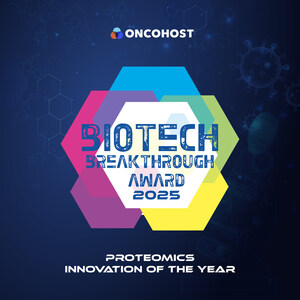JITC Publishes OncoHost Study Identifying Predictive Proteomic Signature to Analyze Treatment Resistance in NSCLC Patients
Peer-Reviewed Paper Reveals Potential Biomarkers in Patient Blood Plasma to Assess Patient Resistance and its Underlying Mechanisms
BINYAMINA, Israel, June 21, 2022 /PRNewswire/ -- OncoHost, a global leader in next-generation precision oncology for improved personalized cancer therapy, today announced a peer-reviewed article published in Journal for Immunotherapy of Cancer (JITC), a BMJ oncology journal. The study highlights the role of blood plasma proteomic profiling for assessing resistance in non-small cell lung cancer (NSCLC) patients being treated with immune checkpoint inhibitors (ICIs).
Over the last decade, ICIs targeting the PD-1/PD-L1 axis have emerged as standard-of-care treatments for NSCLC. Although ICI therapy achieves impressive long-term survival in some, the overall response rate is modest, ranging from 20-30 percent in NSCLC patients. A significant proportion of patients display innate resistance to ICIs, and many of those who derive initial clinical benefit experience disease progression at a later stage. The mechanisms underlying innate and acquired resistance to ICIs are not yet fully understood.
The study, Longitudinal plasma proteomic profiling of non-small cell lung cancer patients undergoing immune checkpoint blockade, focuses on how ICI resistance can be predicted in NSCLC patients through proteomic profiling. The analysis was done using PROphet®, OncoHost's first-of-its-kind diagnostic platform that combines proteomic analysis with AI to predict patient response to immunotherapy and identify resistance associated processes.
"While ICIs have played a major role in revolutionizing cancer therapy, we are still lacking clear biomarkers to predict resistance in patients being treated with these modalities," said Dr. Michal Harel, Director of Science and Innovation at OncoHost. "In this study, we have analyzed the largest and deepest plasma proteome dataset for NSCLC patients receiving ICI-based treatment published so far, revealing a predictive signature for response to treatment comprised of two proteins and two clinical parameters using our AI-powered PROphet platform. In addition, using bioinformatic tools, we have identified 3 subtypes of patients based on their plasma proteome, each subtype with distinct clinical and functional characteristics. Altogether, these results have the power to create a paradigm shift in truly understanding and overcoming resistance to cancer by characterizing systemic proteomic changes along ICI-based therapy."
The paper was authored by a team of Israeli and international scientists and oncologists, including Dr. Michal Harel, Prof. Yuval Shaked, co-founder and Chief Scientific Advisor at OncoHost, and professor of cell biology and cancer science at the Technion - Israel Institute of Technology, and Prof. Adam Dicker, a leading radiation oncologist at Thomas Jefferson University and Chief Medical Officer at OncoHost. Additional key investigators included Dr. David Carbone, professor of internal medicine and director of the James Thoracic Center, Prof. Jair Bar, Deputy Director, Institute of Oncology at Sheba Medical Center, and Dr. Alona Zer, Head, Department of Medical Oncology at Rambam Health Care Campus.
"This paper highlights continued success in our clinical trial initiatives as we prepare for the upcoming U.S. launch of PROphet," said Dr. Ofer Sharon, CEO of OncoHost. "We are finally making significant headway in overcoming the long-standing issue in clinical oncology of patient resistance to treatment. The knowledge that PROphet can provide clinicians with is an industry game-changer, and we are excited to be playing a part in transforming cancer patient care. I am proud of our team and look forward to what lies ahead."
About OncoHost
OncoHost combines life-science research and advanced machine learning technology to develop personalized strategies to maximize the success of cancer therapy. Utilizing proprietary proteomic analysis, the company aims to understand patients' unique response to therapy and overcome one of the major obstacles in clinical oncology today – resistance to therapy. OncoHost's host response profiling platform, PROphet®, analyzes proteomic changes in blood samples to monitor the dynamics of biological processes induced by the patient (i.e., the host) in response to a given cancer therapy. This proteomic profile is highly predictive of individual patient outcome, thus enabling personalized treatment planning. PROphet® also identifies potential drug targets, advancing the development of novel therapeutic strategies as well as rationally based combination therapies.
For more information, visit http://www.oncohost.com.
Follow OncoHost on LinkedIn, Twitter and Facebook.
Media Contact:
FINN Partners for OncoHost
Ellie Hanson
[email protected]
+1 929 588 2006
+972 2 589 2006
SOURCE OncoHost







Share this article